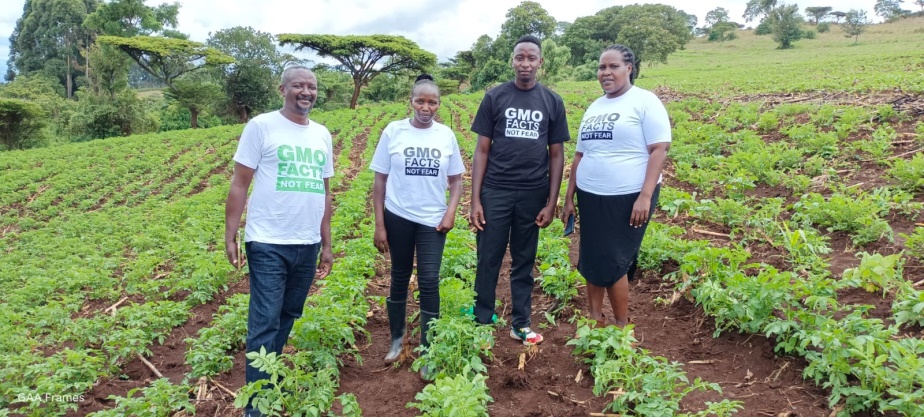Mt. Elgon, which is located on the Kenya-Uganda border, is a high altitude that rises to 4,321 meters above sea level with arable volcanic soils rich in vitamins and nutrients. The mountain region which forms the expansive agricultural land from Bungoma to Kitale towns is also referred to as “the bread-basket of Kenya”. Farmers in the region plant maize, beans, potatoes, tomatoes, onions, cabbage, and virtually all green leafy vegetables and fruits.

The GMO FACTS not FEAR team poses for a photo with Mzee Malinga on his farm on the slopes of Mt. Elgon. The farmer says he rotates his maize and beans with Irish potatoes where harvest has been going down due to lack of certified seed and late blight disease. Photo credit: Andrew Akolo
Mzee Malinga who is a teacher by profession, a community leader, and one of the farmers from the region has expressed that farmers are under constant fear of their potato crops being attacked by late blight which affects their harvest and disrupts supply for their trusted customers who prefer their Shangi potato for its dual-purpose functions.
To keep late blight from fields, farmers must spray their crops continuously, sometimes more than ten times for one crop in anticipation of disease invasion which hikes the costs of production.
Some of the fungicides they use are expensive, which drains the farmers’ resources. Frequent spraying also exposes farmers to chemical contact since most of them have no protective gear. Mzee Malinga while speaking on behalf of potato farmers from his region expressed their desire for a potato variety that would be resistant to late blight and frost which are the two major challenges on farms.

The team at Mzee Malingas potato farm. There were signs of late blight all over the farm which the farmer says costs him a fortune and man-hours to control by spraying. Photo credit: Andrew Akolo
Guaranteeing high yields and returns
According to Mzee Malinga, the only way to make farmers happy is by having a potato variety that will:
- Reduce the cost of production,
- guarantee high yields,
- have a longer shelf life,
- resistant to late blight and frost,
- And is dual purpose so that it can be used to make fries in eating joints and cook in households.
How does the Feed the Future Global Biotech Potato Partnership fit in?
Just like Mzee Malinga, potato farmers across the country experience the same challenges and tend to solve them in the same way. This calls for an improved robust potato variety that thrives in all potato-growing regions of the country and serves farmers from other regions that would love to experiment for sheer love.
The 3 R-gene biotech potatoes that is soon to be released for propagation can significantly increase incomes, food security, and farmer safety through reduced use of fungicides. The variety is extremely resistant to late blight disease and doesn’t need continuous fungicide spraying.

Potato vender Abel Kirui decried the infiltration by middlemen who pay very little for potatoes from the farms. It’s unfortunate that farmers can only access their farms using tractors and donkey to transport potatoes to market centers where they are picked by middlemen who do not factor the costs farmers have incurred.
This biotech potato is safe to grow and consume just like the conventional one grown by farmers in Kenya. Arguments that GMO potatoes cause diseases or drug resistance in humans is farfetched and out of place. The natural resistance found in biotech potatoes has been transferred from its wild relatives using biotechnology tools.
Smallholder potato farmers will reap tremendous benefits from the 3 R-gene late blight resistant biotech potato since it handles most of their challenges with current varieties. Late blight resistance means no more frequent spraying and exposure to chemicals which is also environmentally healthy. This variety will help farmers conserve nature.

